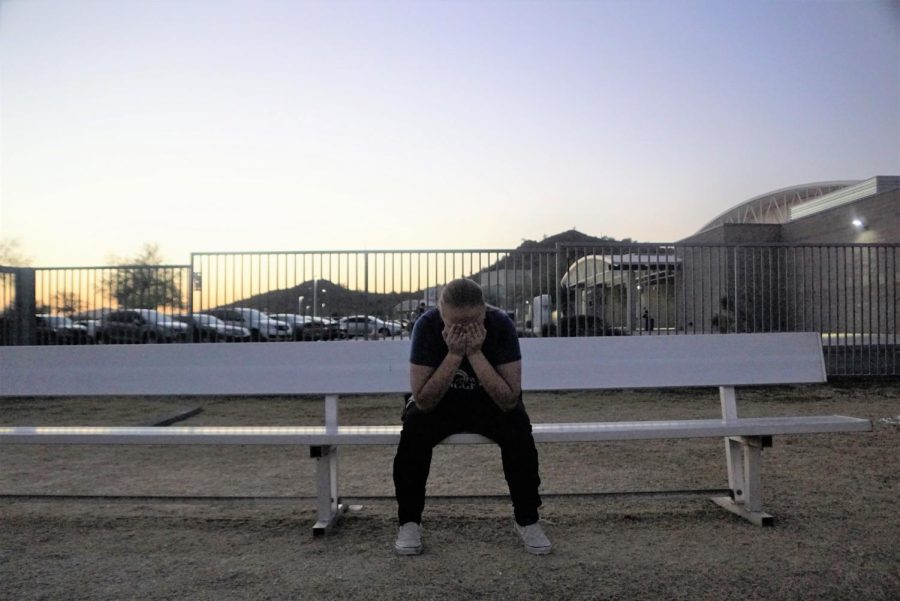Inside the mind of a student athlete
Emily Osborn, senior, reflects on her performance after a rigorous soccer practice.
January 23, 2023
Athletes have to be some of the strongest people in the world to play their sport, but the mental aspect of being an athlete is often overlooked. With the pressure of trying to be perfect and the work ethic it takes to get a starting spot in the line up, athletes are challenged both physically and emotionally when it comes to their sport.
Student athletes are often expected to function without any flaws or distractions when it comes to their grades and sport. The sheer amount of time and effort one must put into their sport takes away from time that could potentially be used to do school work and vise-versa.
“I feel like people think that athletes are like robots, play their sport, get good grades, go to sleep, and that’s not how it works and I think there is a big misconception about that. They are people before they are athletes,” said Maisie Jesse, senior.
Overcoming the stereotype of having to be perfect is often difficult for many students and even more so for student athletes.
“I think there is more stigma. A negative connotation towards athletes’ mental health than other students’, because other students are allowed to seem vulnerable while athletes are supposed to be the popular kids. You’re the athlete. You can’t have a mental breakdown, you need to be that top person,” said Tom DeVito, wrestling coach.
Mental strength is oftentimes said to athletes in regard to getting through workouts and getting better at one’s sports. What many coaches and even players disregard is the difference between mental health and mental toughness.
“Mental toughness is preached to athletes so much. You have to push through your sprints, you have to push through your hard practices and they preach that so much but it’s different. Mental toughness and mental health are completely different things and they should not be intertwined at all. Mental health is not something that you can necessarily push through without the help of a sports psychologist or therapist,” Jesse said,
The pressure athletes are put under often drives them into a depression or state of anxiety. Finding help can be difficult for anyone but especially those who are constantly told they are supposed to be perfect in every aspect of their lives.
“There is nothing wrong with you. I feel like a lot of people always feel like there’s something wrong with them because they feel that way. Especially when the people around you don’t speak up about it then you really start to feel like you’re broken,” Jesse said.
Having a positive environment plays a vital role in the development of an athlete both physically and mentally, but knowing that you have someone to talk to, whether it be your teammates or coaches, also helps eliminate the feeling of loneliness.
“Understand that your team is around you. Yes, you may dislike me as a head coach. Yes, you may dislike what I’m doing but understand that you have teammates and assistant coaches around you who will listen to you and talk to you about whatever needs to be talked about,” DeVito said.
It can be daunting talking about one’s mental state and the stigma around mental health, especially in athletes, makes it even more difficult for one to seek out help.
“I think that we need to do a better job of letting athletes know that they are more than their stats, more than their performance, more than their grades,” Jesse said. “Your sport is what you do, not what you are.”
Oftentimes, when athletes are in a bad place mentally, it affects their physical performance which only adds to the feeling of being a failure.
“When I have a bad game it affects me mentally and I remember everything I did wrong. My performance on the field will wear on me for days or even weeks and all I can think about is what I could have done better,” said Emily Osborn, senior.
Athletes can sometimes feel overwhelmed by their sport and the mental toll it takes on them. Last spring, the collegiate world lost a numerous amount of athletes to suicide, which brought more attention to the mental health of athletes.
“I think that because society is changing more of the mental health struggles are coming to the surface. I think it is very important that when you’re choosing a school as an athlete to take into consideration the resources they have,” Jesse said.
Unfortunately, not every athlete has access to a sports psychologist or even a therapist, which is why knowing who you can talk to is important.
“In the classroom and on the mat I talk to my students and my athletes about mental health.. I’ve seen and lost too many friends to suicide,” DeVito said.
Being able to identify when you are in a bad spot mentally and accepting that you need help is one of the hardest things someone can do, but having a good support group behind oneself, makes the process a lot easier.
“Having people behind you to help you makes it a smoother process. Being able to talk to your friends or teammates and knowing that they’ve been through something similar really helps you know that one, you’re not alone, and two, people are there for you and they want to see you succeed,” Osborn said.
Feeling alone is one of the biggest struggles when it comes to mental health, but having a support group and being able to talk to someone about your current mental state can help subdue any thoughts of feeling broken or alone.
“Being able to reach out and admit you need help is the first step, but actually finding someone to talk to that will understand is insanely difficult. Sometimes no matter what you do or say it feels like everyone is judging you,” Osborn said.
Being an athlete can be incredibly stressful and degrading at times, but in the end it should be a privilege and not an obligation.
“I think when you’re in a slump people just think ‘oh I need to get back to where I was before,’ but if you get help then you are going to go 10 steps beyond where you were,” Jesse said. “Being an athlete should add to your life, not take it.”





